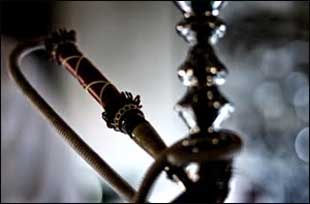- Home
- Editorial
- News
- Practice Guidelines
- Anesthesiology Guidelines
- Cancer Guidelines
- Cardiac Sciences Guidelines
- Critical Care Guidelines
- Dentistry Guidelines
- Dermatology Guidelines
- Diabetes and Endo Guidelines
- Diagnostics Guidelines
- ENT Guidelines
- Featured Practice Guidelines
- Gastroenterology Guidelines
- Geriatrics Guidelines
- Medicine Guidelines
- Nephrology Guidelines
- Neurosciences Guidelines
- Obs and Gynae Guidelines
- Ophthalmology Guidelines
- Orthopaedics Guidelines
- Paediatrics Guidelines
- Psychiatry Guidelines
- Pulmonology Guidelines
- Radiology Guidelines
- Surgery Guidelines
- Urology Guidelines
Hookah smoking unsafe, impairs blood vessel function

A new study finds that hookah tobacco smoking, like cigarette tobacco smoking, impairs blood vessel function. The findings of the research were presented in Chicago at the American Heart Association's Scientific Sessions 2018.
Hookah tobacco smoking is often marketed as a harmless alternative to cigarettes. There are several studies which provided clear evidence that cigarette smoking damages endothelial function (thin membrane lining the inside of the blood vessel), but there is no strong evidence about how smoking flavored hookah tobacco impacts blood vessels.
Read Also: Prenatal tobacco smoke exposure worse than postnatal smoke exposure
In order to find the relationship between flavored hookah and its impact, if any, on blood vessels, a collaborative research took place between the University of California, Los Angeles, School of Nursing; University of California, San Francisco, School of Medicine; and the Smidt Heart Institute at Cedars-Sinai Medical Center.
The researchers studied 30 young adults (average age 26) hookah smokers before and after charcoal-heated Hookah tobacco smoking. They measured nicotine levels in the blood, exhaled carbon monoxide and flow-mediated dilation of blood vessels (a measure of endothelial function).
In 20 participants, they took the same measurements before and after electrically heating the same hookah flavored tobacco product. They also compared results to similarly aged cigarette smokers after smoking one cigarette. Finally, they took the same measurements before and after a group of hookah smokers breathed a carbon monoxide gas mixture to mimic the carbon monoxide boost they get from smoking traditional charcoal-heated hookah.
The study found that while nicotine levels increased similarly with all smoking products, exhaled carbon monoxide increased 9- to 10-fold with charcoal-heated hookah smoking compared to electronically-heated hookah or cigarette smoking. While charcoal-heated hookah smoking increased flow-mediated dilation, smoking electrically-heated hookah tobacco or cigarette tobacco similarly and substantially decreased flow-mediated dilation (indicating impairment of endothelial function).
"Hookah is the only form of tobacco product that uses burning charcoal briquettes to heat the flavored tobacco in the water pipe. So, in addition to toxic substances from tobacco and nicotine, hookah smoke exposes users to charcoal combustion products, including large amounts of carbon monoxide," said Mary Rezk-Hanna, Ph.D., study lead author and assistant professor at the University of California, Los Angeles School of Nursing.
Read Also: World Heart Day: WHO calls for controlled tobacco use to avoid heart ailments
The key difference between charcoal and electrically-heated hookah or cigarette tobacco smoking is the production of high levels of carbon monoxide from charcoal briquettes. Carbon monoxide is known to dilate blood vessels and appears to mask the effects of charcoal-heated hookah tobacco smoke to impair endothelial function, according to Rezk-Hanna.
“Hookah use, either charcoal or electrically-heated, may impair other aspects of endothelial functions, which are critical for cardiovascular health,” write the authors.
For reference log on to https://newsroom.heart.org/news/blood-vessel-function-takes-harmful-hit-from-hookah-tobacco-smoking?preview=b48523a7c6cf5abe79c225cb402113cd

Disclaimer: This site is primarily intended for healthcare professionals. Any content/information on this website does not replace the advice of medical and/or health professionals and should not be construed as medical/diagnostic advice/endorsement or prescription. Use of this site is subject to our terms of use, privacy policy, advertisement policy. © 2020 Minerva Medical Treatment Pvt Ltd